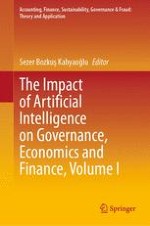2021 | OriginalPaper | Chapter
16. Ethico-Juridical Dimension of Artificial Intelligence Application in the Combat to Covid-19 Pandemics
Author : Muharrem Kiliç
Published in: The Impact of Artificial Intelligence on Governance, Economics and Finance, Volume I
Publisher: Springer Nature Singapore
Activate our intelligent search to find suitable subject content or patents.
Select sections of text to find matching patents with Artificial Intelligence. powered by
Select sections of text to find additional relevant content using AI-assisted search. powered by
